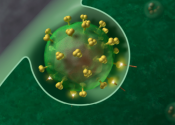New treatment to reverse drug resistance in some cancers
University of Queensland researchers have discovered how to reverse drug resistance in skin and mouth squamous cell carcinomas.
Jun 28, 2018
0
85
University of Queensland researchers have discovered how to reverse drug resistance in skin and mouth squamous cell carcinomas.
Jun 28, 2018
0
85

Research by Cardiff University has uncovered the brain activity that underlies absence epilepsy, offering new hope for the development of innovative therapies for this disabling disease.
Jun 11, 2018
0
69

Scientists at the University of Maryland School of Medicine have for the first time found direct causal links between the neurotransmitter dopamine and avoidance—behavior related to pain and fear.
Apr 19, 2018
0
417

Neck and back pain are debilitating and expensive: an estimated 80 percent of adults will suffer one or both at some point during their lives, racking up $86 billion in medical costs and missed work in the United States alone. ...
Apr 17, 2018
0
59

Some people disturbed by the 2016 presidential election have suffered a loss of appetite, trouble sleeping and concentrating, and have become easily annoyed, while others equally disturbed by the election result have not ...
Feb 5, 2018
4
63

The amygdala is a tiny hub of emotions where in 2016 a team led by MIT neuroscientist Kay Tye found specific populations of neurons that assign good or bad feelings, or "valence," to experience. Learning to associate pleasure ...
Jan 23, 2018
0
331

Mount Sinai researchers have identified a protein produced by the immune system—granulocyte-colony stimulating factor (G-CSF)—that could be responsible for the development of cocaine addiction.
Jan 16, 2018
0
478

A characteristic electrical-activity pattern in a key brain region predicts impulsive actions just before they occur. A brief electrical pulse at just the right time can prevent them, Stanford scientists have found.
Dec 19, 2017
0
713

When HIV-1 infects an immune cell, the virus travels to the nucleus so quickly there's not enough time to set off the cell's alarm system.
Dec 1, 2017
0
322

Before you shop for the "cuddle" hormone oxytocin to relieve stress and enhance your social life, read this: a new study from the University of California, Davis, suggests that sometimes, blocking the action of oxytocin in ...
Sep 20, 2017
2
584
